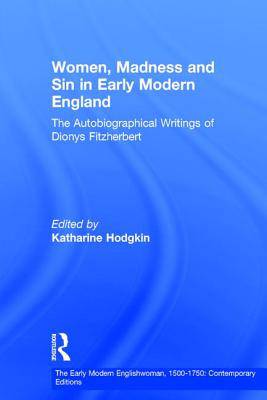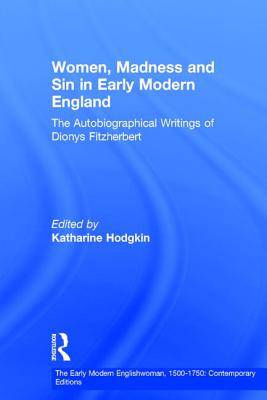
Je cadeautjes zeker op tijd in huis hebben voor de feestdagen? Kom langs in onze winkels en vind het perfecte geschenk!
- Afhalen na 1 uur in een winkel met voorraad
- Gratis thuislevering in België vanaf € 30
- Ruim aanbod met 7 miljoen producten
Je cadeautjes zeker op tijd in huis hebben voor de feestdagen? Kom langs in onze winkels en vind het perfecte geschenk!
- Afhalen na 1 uur in een winkel met voorraad
- Gratis thuislevering in België vanaf € 30
- Ruim aanbod met 7 miljoen producten
Zoeken
Women, Madness and Sin in Early Modern England
The Autobiographical Writings of Dionys Fitzherbert
€ 305,45
+ 610 punten
Omschrijving
A fascinating case study of the complex psychic relationship between religion and madness in early seventeenth-century England, the narrative presented here is a rare, detailed autobiographical account of one woman's experience of mental disorder. The writer, Dionys Fitzherbert, recounts the course of her affliction and recovery and describes various delusions and confusions, concerned with (among other things) her family and her place within it; her relation to religion; and the status of the body, death and immortality. Women, Madness and Sin in Early Modern England presents in modern typography an annotated edition of the author's manuscript of this unusual and compelling text. Also included are prefaces to the narrative written by Fitzherbert and others, and letters written shortly after her mental crisis, which develop her account of the episode. The edition will also give a modernized version of the original text. Katharine Hodgkin supplies a substantial introduction that places this autobiography in the context of current scholarship on early modern women, addressing the overarching issues in the field that this text touches upon. In an appendix to the volume, Hodgkin compares the two versions of the text, considering the grounds for the occasional exclusion or substitution of specific words or passages. Women, Madness and Sin in Early Modern England adds an important new dimension to the field of early modern women studies.
Specificaties
Betrokkenen
- Uitgeverij:
Inhoud
- Aantal bladzijden:
- 300
- Taal:
- Engels
- Reeks:
Eigenschappen
- Productcode (EAN):
- 9780754630180
- Verschijningsdatum:
- 28/10/2010
- Uitvoering:
- Hardcover
- Formaat:
- Genaaid
- Afmetingen:
- 156 mm x 234 mm
- Gewicht:
- 598 g

Alleen bij Standaard Boekhandel
+ 610 punten op je klantenkaart van Standaard Boekhandel
Beoordelingen
We publiceren alleen reviews die voldoen aan de voorwaarden voor reviews. Bekijk onze voorwaarden voor reviews.








